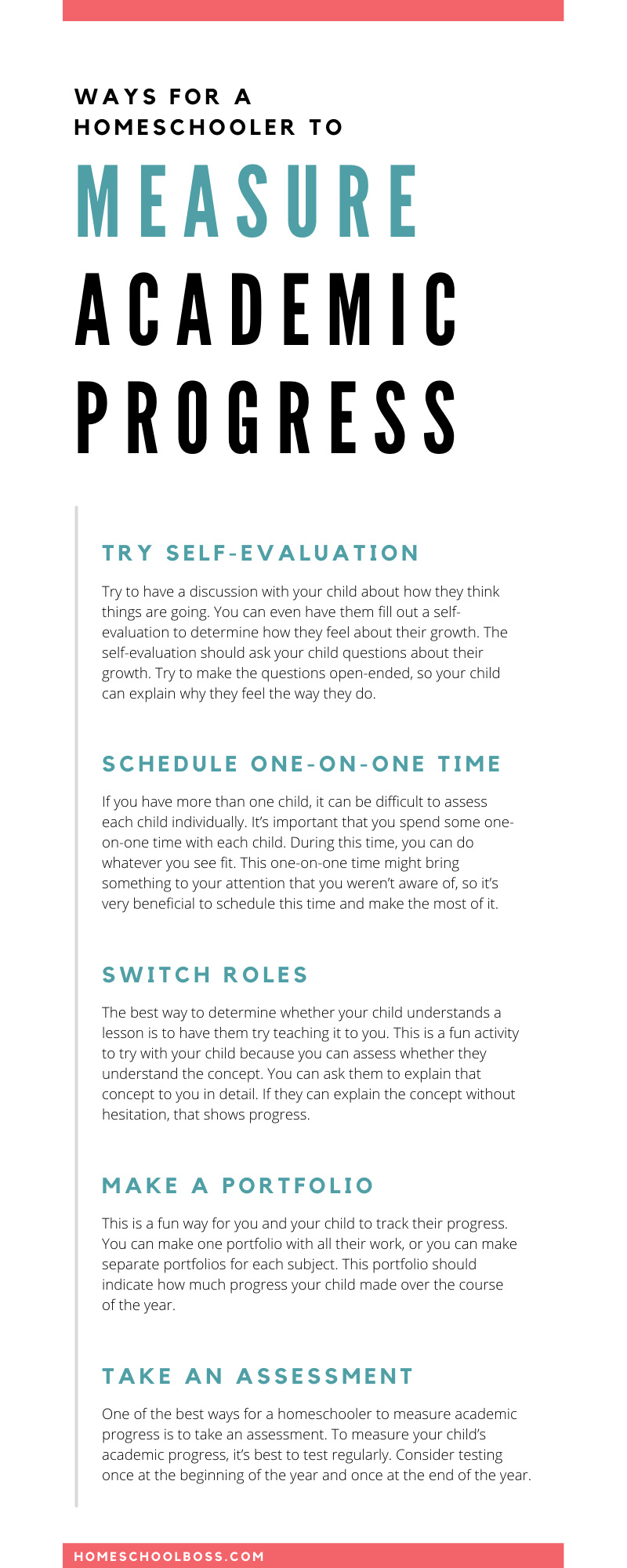
Homeschooling is rewarding, but it can also be challenging at times. Some parents struggle because they cannot tell if their child is showing progress. Since there isn’t a teacher to determine whether your child is behind or ahead of schedule, it can be difficult to know exactly where they stand as far as academic progress is concerned. Fortunately, there are many ways for a homeschooler to measure academic success. If you want to learn about the various ways to measure academic progress, keep reading.
Try Self-Evaluation
It’s important to emphasize the importance of progress. Many kids get frustrated when they get something wrong or if it takes them a while to understand a topic. Encourage your child to look at their growth when they reflect on their day. Try to have a discussion with your child about how they think things are going. You can even have them fill out a self-evaluation to determine how they feel about their growth. This evaluation can also force them to acknowledge the growth they experience on a daily and weekly basis.
The self-evaluation should ask your child questions about their growth. Try to make the questions open-ended, so your child can explain why they feel the way they do. There are many things you could ask on the self-evaluation. For example, you could ask what mistakes your child feels they made that day. Next, you could ask what that mistake taught them. This gets kids to think about how their mistakes teach them something and help them grow.
Another idea is to give your child a questionnaire where they rate the difficulty of a particular task. Over time, you can have your child re-answer the questionnaire. As time passes, compare the ratings on each questionnaire. If your child indicates that a topic became easier over time, this shows that your child has progressed.
Schedule One-on-One Time
If you have more than one child, it can be difficult to assess each child individually. It’s important that you spend some one-on-one time with each child. You spend nearly every day with your child, so you know them well. If they struggle with a particular lesson, you are sure to notice. The same goes for progress. If your child shows progress in an area, you are sure to notice that as well. Even if you only have time for a few minutes each week, it’s important to schedule one-on-one time.
During this time, you can do whatever you see fit. For example, you can have a conversation with your child, if they are old enough, about their progress. Ask them how they are doing. Is there a subject they struggle with on a regular basis? Did they recently overcome a struggle and turn it into a strength? These are questions you can ask your child to understand how they feel about their academic journey. This one-on-one time might bring something to your attention that you weren’t aware of, so it’s very beneficial to schedule this time and make the most of it.
This one-on-one-time is also a good opportunity to watch your child work. For example, division is something many kids see as a challenge. This is a good time to watch your child walk through the steps to ensure that they’re doing the math right. If they have any questions, this is a great time to answer them. If you have more than one kid, it might be hard to focus on just one child. You might miss the mistakes they’re making if you’re trying to teach multiple ages at once. One-on-one-time allows you to assess and evaluate each child individually, which makes it easier to identify their progress.
Switch Roles
The best way to determine whether your child understands a lesson is to have them try teaching it to you. This is a fun activity to try with your child because you can assess whether they understand the concept. For example, you can ask your child to teach a math lesson about multiplication. As the teacher, your child should explain how to do the problem from start to finish. This is a great way to catch any mistakes they make along the way. If the child is confident and thorough with their explanation, it’s safe to say they understand the concept. If the child is hesitant while they explain the equation, they might need some more help with that topic.
A great way to show a child’s progress is to have them answer a question they previously got wrong. Let’s pretend the child had a hard time understanding the multiples of nine. You can ask them to explain that concept to you in detail. If they can explain the concept without hesitation, that shows progress.
Make a Portfolio
Another way to measure academic progress is to make a portfolio. This is a fun way for you and your child to track their progress. You can make one portfolio with all their work, or you can make separate portfolios for each subject. For example, you can make one portfolio with all their writing in it. Start the portfolio with their first piece of writing for the year. You can put every assignment in the portfolio, or you can ask your child to choose a few of their favorite assignments. The last portfolio entry should be their most recent assignment.
This portfolio should indicate how much progress your child made over the course of the year. Your child can see how their handwriting improved, for example. They can also see how their thoughts became more complex. It can be difficult to recognize progress in the moment, but a portfolio forces us to see the growth that happens along the way. This is also a fun way for students to see all the work they did throughout the year.
Take an Assessment
One of the best ways for a homeschooler to measure academic progress is to take an assessment. To measure your child’s academic progress, it’s best to test regularly. Consider testing once at the beginning of the year and once at the end of the year.
At Homeschool Boss, we offer an online assessment test for homeschoolers. We proudly offer the NWEA MAP Growth test because it is untimed, online, adaptive, and cross-grade. MAP Growth provides an explanation of what your child is ready to learn so you can maximize their education. Our goal at Homeschool Boos is to make homeschooling as stress-free as possible. Feel free to give us a call if you have any questions or if you’re interested in booking a test. We are more than happy to assist you with anything you need.

Pingback: Homeschooling 101: All You Need to Know About Homeschool Testing
Comments are closed.